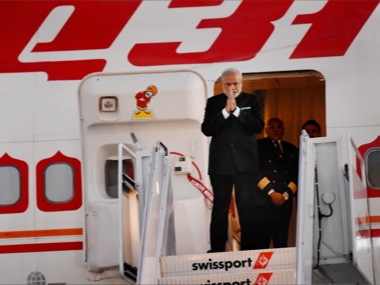New York, Sep 29: Prime Minister Narendra Modi left for home after concluding his two-nation tour of Ireland and the US.
"My USA demonstrates the extraordinary depth and diversity of our relationship. A lot of ground has been covered in these few days (sic)," Modi tweeted before his departure.
 "I got the opportunity to attend a widespread of programmes each of which generated many positive outcomes that will benefit India," he said in another tweet reflecting on the series of meetings he attended during his US visit.
"I got the opportunity to attend a widespread of programmes each of which generated many positive outcomes that will benefit India," he said in another tweet reflecting on the series of meetings he attended during his US visit.
"I shared my thoughts on key global issues at the @ UN and also met many more leaders to strengthen India's ties with the global community," the Prime Minister tweeted.
"My gratitude to the American people for the very warm welcome and the hospitality wherever my delegation & I went," he said.
In the first leg of his seven-day trip, Modi visited Ireland, marking first Prime Ministerial visit from India in almost 60 years. In Dublin, he held talks with Enda Kenny, the Taoiseach of Ireland.
On September 23, he flew to New York, where he addressed a UN Sustainable Development Summit and participated in a Summit on peacekeeping hosted by US President Barack Obama.
The Prime Minister also met several world leaders and had interactions with leading investors and financial sector firms. There was a working dinner where major Fortune-500 companies were present to deliberate on investment opportunities in India.
He also traveled to West Coast where he visited Facebook Headquarters for a Townhall Q&A with its CEO Mark Zuckerberg. He also visited Google campus and Tesla Motors.
In San Jose, he interacted with the Indian community on September 27. On the last day of his visit, Modi met leaders of the three permanent members of the UN Security Council -- US President Barack Obama, British Prime Minister David Cameron and French President Francois Hollande.





Comments
Add new comment